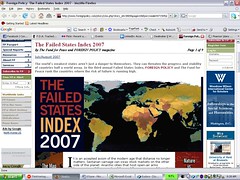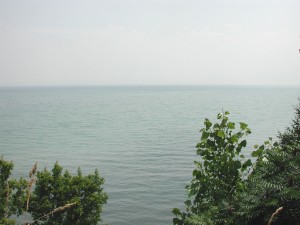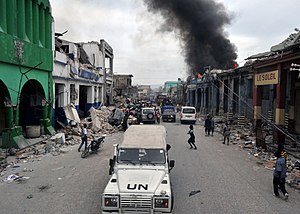As this battered land struggles to recover, some troubling questions remain: Why does God allow suffering? When will tragedies end? There is an answer! On January 12, 2010, the island nation of Haiti was jolted by the worst earthquake in the region in two centuries. The catastrophe caused horrific suffering that defied description. More than 300,000 people perished, with hundreds of thousands injured, and more than a million homeless.
The National Palace—Haiti’s "White House"—collapsed into rubble. Parliament, the United Nations headquarters and virtually every government building was rendered uninhabitable. Churches, schools and banks were destroyed, as was the most upscale hotel in Haiti’s capital. Hospitals and police stations that should have been tending to the victims were instead reduced to ruins.
As the editors of TIME magazine put it, "In Haiti, order, safety, comfort, all perished. But the first to die was dignity" (Haiti: Tragedy and Hope, March 2, 2010, p. 16). Corpses of the dead were stacked along the roadside where struggling survivors passed by, some looking for missing family members, others wandering aimlessly in shock.
Even a year later, in the midst of a cholera epidemic that had killed al-most 2,000 Haitians by early December, it is still hard to grasp fully just how overwhelming this catastrophe was, and the depth of the damage it has done to an already troubled nation.
Why Haiti? But why did such a disaster strike a nation already crippled by poverty, unemployment, and corruption? When the January 12 earthquake struck, some were quick to cast blame for the disaster. Some said it was God punishing Haiti for an alleged voodoo-influenced "pact with the devil" made to oust the colonial French at the end of the 18th century. Author Jeanne Pocius notes that some religious leaders were quick to blame other religions. "Sadly, some of the smaller religious sects have taken the tack of ‘accusatory evangelism.’ Spouting the fallacious claims that ‘It is the fault of them not us,’ with various sects accusing… whomever of having caused God’s wrath via the earthquake to strike down sinners. They are forgetting, of course, that every part of society experienced losses: every denomination faced fallen houses of worship, lost members, and suffered from the earthquake and its aftermath" (Shaken, Not Stirred: A Survivor’s Account of the January 12, 2010 Earthquake in Haiti, p. 190).
It can be easy to cast blame when bad things happen in the world. People want to understand why things are the way they are, especially when they go wrong. So, why did the disaster in Haiti occur? More broadly, why do disasters happen in many places in every corner of the world?
Nearly 2,000 years ago, Jesus Christ posed this same question to His disciples. His answer is helpful today, as we struggle to find answers in times of great loss. Notice: "There were present at that season some who told Him about the Galileans whose blood Pilate had mingled with their sacrifices. And Jesus answered and said to them, ‘Do you suppose that these Galileans were worse sinners than all other Galileans, because they suffered such things? I tell you, no… Or those eighteen on whom the tower in Siloam fell and killed them, do you think that they were worse sinners than all other men who dwelt in Jerusalem? I tell you, no…’" (Luke 13:1–5).
Jesus Christ explained plainly that great suffering is not necessarily caused by greater sin. Sometimes accidents are simply products of "time and chance" (Ecclesiastes 9:11). We certainly need to ask for God’s protection and guidance every day of our lives. And we should learn from Christ’s example not to condemn others when calamity happens, for "with what judgment you judge, you will be judged; and with the measure you use, it will be measured back to you" (Matthew 7:2). God is our judge—and our neighbor’s also (Romans 14:4).
But notice another important aspect of Christ’s words in Luke 13. After explaining that the men he mentioned were not worse sinners than others, He added this powerful warning: "[B]ut unless you repent you will all likewise perish…" (v. 5). The Galileans, or the victims of the tower of Siloam—or the Haitians who suffered in the 2010 earthquake—are not greater sinners than the rest of us are. And unless we all repent, we shall all likewise perish!
What is the lesson from Haiti? What can we learn from the great destruction that this tiny Caribbean nation endured? Frankly, what are we to learn from all of the suffering that humanity has endured since the dawn of creation? The disaster in Haiti was not the first in history, nor will it be the last. Truly, 6,000 years of human history has all too often been the story of pain, grief, and suffering. But why? Where did it all begin? Where will it all end?
The True Origin of Suffering When God created the first man, He placed him in the garden of Eden. God told Adam, and later his wife Eve, how to thrive in the world God had created for them. We read: "And the Lord God formed man of the dust of the ground, and breathed into his nostrils the breath of life; and man became a living being… Then the Lord God took the man and put him in the garden of Eden to tend and keep it. And the Lord God commanded the man, saying, ‘Of every tree of the garden you may freely eat; but of the tree of the knowledge of good and evil you shall not eat, for in the day that you eat of it you shall surely die’" (Genesis 2:7, 15–17).
Those were God’s very simple rules. But then Satan the devil entered the picture. This spirit being had once been the great archangel Lucifer, but became Satan—the "Adversary"—when he rebelled against God (Isaiah 14:12–14; Ezekiel 28:14–17). Satan tempted Eve to ignore God’s warning and eat of the fruit. Through her sin, and her husband’s decision to follow her in this defiant act, sin entered the human family. Through their choice, they brought on themselves pain, grief and suffering. Notice what God told Eve: "To the woman He said: ‘I will greatly multiply your sorrow and your conception; In pain you shall bring forth children’" (Genesis 3:16). To Adam, He said, "Cursed is the ground for your sake; in toil you shall eat of it all the days of your life. Both thorns and thistles it shall bring forth for you, and you shall eat the herb of the field. In the sweat of your face you shall eat bread till you return to the ground" (Genesis 3:17–19).
Adam and Eve tasted the suffering that comes with sin, and earned the death penalty (Romans 3:23; 6:23). And all of humanity has followed that same course ever since, sadly reaping the same consequences (1 Corinthians 15:21–22). That is the origin of the pattern of suffering that has been going on for thousands of years—and continues to this day.
The Origin of Sin But if God is all-powerful, kind and good, could He not stop the pain? Why has He allowed generation after generation to experience horrific grief? This question strikes at the heart of why there is so much suffering in the world—and the answer is that this is not our Heavenly Father’s world. Long ago, God the Father gave rulership of the earth to the archangel Lucifer, the being who became Satan the devil through rebellion. Scripture calls Satan—who has blinded those who do not believe the Gospel—the "god of this age" (2 Corinthians 4:3–4). He is also called the "prince of the power of the air, the spirit who now works in the sons of disobedience" (Ephesians 2:2). It is Satan who influences mankind to hate, lust, envy and covet, and thus reap consequences of sin. The Apostle John warned us not to love Satan’s ways or his world, lest we reap the same consequences as others have: "Do not love the world or the things in the world. If anyone loves the world, the love of the Father is not in him. For all that is in the world—the lust of the flesh, the lust of the eyes, and the pride of life—is not of the Father but is of the world. And the world is passing away, and the lust of it; but he who does the will of God abides forever" (1 John 2:15–17).
Your Bible promises a better world coming, when Jesus Christ returns to rule the earth. But that time is not here yet. Remember His words to Pilate: "My kingdom is not of this world. If My kingdom were of this world, My servants would fight… but now My kingdom is not from here" (John 18:36). Our world is not yet God’s world. It is under the sway of Satan, whom Christ called the "ruler of this world" (John 14:30).
Tests and Trials Do not misunderstand—God is still more powerful than Satan. And God loves human beings, whom He created to become His literal children (1 John 4:8, 16). So, why does God allow Satan to cause such harm? The biblical story of Job can be helpful as we grapple to understand the purpose of suffering.
Early in the story of Job, we find Satan presenting himself to God with the other heavenly beings. In the discourse that follows, God gave Satan permission to strike at Job—within certain limits. Satan’s aim was to turn Job against God and destroy him. But God’s plan was to turn Satan’s wrath into a test for Job—an opportunity to grow in faith and spiritual depth.
So, what happened? Raiders stole Job’s oxen and donkeys (Job 1:14–15), lightning killed his sheep and their shepherds (Job 1:16), and Chaldean bandits stole a herd of his camels and killed their guards (v. 17). Job was then told of a great tragedy: "Your sons and daughters were eating and drinking wine in their oldest brother’s house, and suddenly a great wind came from across the wilderness and struck the four corners of the house, and it fell on the young people, and they are dead" (vv. 18–19).
Imagine Job’s grief! What an awful tragedy! In one day, Job had lost most of his wealth and much of his family. But his suffering had only just begun. God allowed Satan to afflict Job further, but commanded him to stop short of taking his life. "So Satan went out from the presence of the Lord, and struck Job with painful boils from the sole of his foot to the crown of his head… Then his wife said to him, ‘Do you still hold fast to your integrity? Curse God and die!’ But he said to her, ‘You speak as one of the foolish women speaks. Shall we indeed accept good from God, and shall we not accept adversity?’ In all this Job did not sin with his lips" (Job 2:7, 9–10).
Job’s anguish was so over-whelming that he wished he had never been born (Job 3:1) and that God would go ahead and crush him (6:9). He grappled with the painful question: Why? Was God unfair? His was a monumental struggle. He wanted to "call God into court" for allowing all these evils to happen (9:19, 32–33) and he felt bitter because he could not sue God for the injustice He allowed!
What was God looking for? Why did He allow Job’s suffering? He allowed this great trial to soften Job’s heart, and to lead him to greater repentance.
Eventually, Job came to realize that he had blamed God unfairly and rashly. He began to understand that God is always righteous, and that he always has our ultimate welfare in mind. Though we may not understand it while we are suffering, God’s aim is to use all of our experiences to lead us to repentance. Finally, Job praised God for His wisdom and fairness. He thankedGod for helping him repent of his sins more deeply. "I have heard of You by the hearing of the ear, but now my eye sees You. Therefore I abhor myself, and repent in dust and ashes" (Job 42:5–6).
As with Job, God wants each of us to obey and trust Him, and to seek deep repentance. Along the way, He sometimes allows us to suffer the consequences of living in Satan’s world, so we will want to resist Satan and reject him! We should understand that our present mortal life is a mere "laboratory" in which God has placed us to learn lessons of character and submission to His will. When we suffer great trials, we can learn to trust in Him ever more deeply (James 1:2–4).
The prophet Isaiah wrote, "Seek the Lord while He may be found, call upon Him while He is near. Let the wicked forsake his way, and the unrighteous man his thoughts; let him return to the Lord, and He will have mercy on him; and to our God, for He will abundantly pardon" (Isaiah 55:6–7). Our natural human thoughts are not God’s thoughts. The ways that come naturally to us are not His ways (v. 8). So, God is allowing human society 6,000 years to go its own way, to experience firsthand that life without God—life following Satan’s selfish ways—brings only pain, regret and remorse. Yet, even in the midst of Satan’s world, we can be saved if we turn to God with our whole heart! "The Lord is not slack concerning His promise, as some count slackness, but is longsuffering toward us, not willing that any should perish but that all should come to repentance" (2 Peter 3:9).
Preparing for the Kingdom Yes, there is a better world coming—after Jesus Christ returns to establish His Kingdom. Shockingly, however, rebellious humanity will launch a massive attack against Christ when He returns to earth at Jerusalem. Unclean spirits will incite the "kings of the earth and of the whole world, to gather them to the battle of that great day of God Almighty.… And they gathered them together to the place called in Hebrew, Armageddon" (Revelation 16:14, 16). These gathered armies will try to defeat the returning Christ. Of course, they will not prevail, for "the Lord will go forth and fight against those nations, as He fights in the day of battle." (Zechariah 14:3). Christ will utterly defeat all those who oppose His ways and attempt to prolong Satan’s despotic rule on earth.
Jesus Christ will set His feet on the Mount of Olives, and it "shall be split in two, from east to west, making a very large valley" (v. 4). There will be a massive earthquake such as has never occurred on earth—one that makes even the tragic Haiti quake seem small by comparison. Cities of the nations will fall, islands will disappear, and mountains will be leveled (Revelation 16:18–20). Why? To show once and for all that human society apart from God cannot stand, and will not last.
Even after this terrible plague, some—unfathomably—will for a time still blaspheme God (v. 21). But as the dust settles, debris will be cleared away to make way for a worldwide rebuilding program. Survivors will be comforted, cared for and taught God’s ways. "And the ransomed of the Lord shall return, and come to Zion with singing, with everlasting joy on their heads. They shall obtain joy and gladness, and sorrow and sighing shall flee away" (Isaiah 35:10).
A peaceful and harmonious new society will arise, with its foundations based on God’s laws and ways. God’s Spirit will be poured out on all humanity (Joel 2:28–29). A new world will be built, filled with joy and happiness. Think of it! Neighbors will care for neighbors. Husbands will love their wives, and wives will love their husbands. Parents will bring up their children "in the training and admonition of the Lord" (Ephesians 6:4). Peace will reign, and wild beasts "shall not hurt nor destroy in all My holy mountain, for the earth shall be full of the knowledge of the Lord as the waters cover the sea" (Isaiah 11:9). Yes, a wonderful world is coming!
You can prepare for that Kingdom now. You can ask God to grant you repentance and understanding, to truly walk in His ways as never before. And you can help build this new society, coming soon! The prophet Isaiah says to those who truly seek God, "The Lord will guide you continually, and satisfy your soul in drought, and strengthen your bones.… Those from among you shall build the old waste places; you shall raise up the foundations of many generations" (Isaiah 58:11–12). The time is coming when the suffering and destruction we now see all around us—in Haiti as well as around the globe—will only be a distant memory. May God speed that day! |
 Image by Esthr via FlickrSOMALIA IS A FAILED STATE ACCORDING TO ITS CRITICS...
Image by Esthr via FlickrSOMALIA IS A FAILED STATE ACCORDING TO ITS CRITICS...

























Post new comment